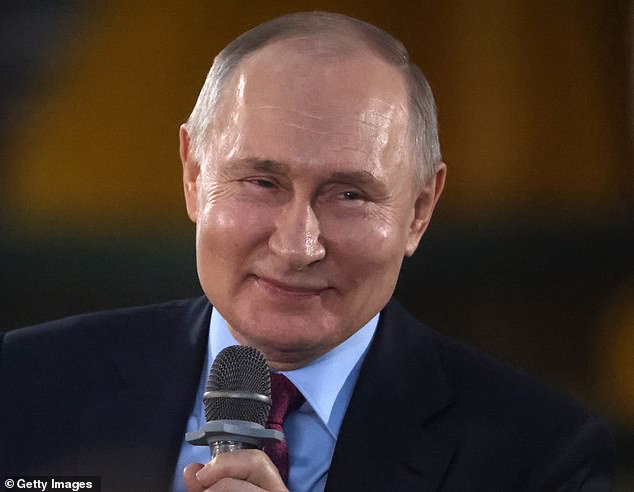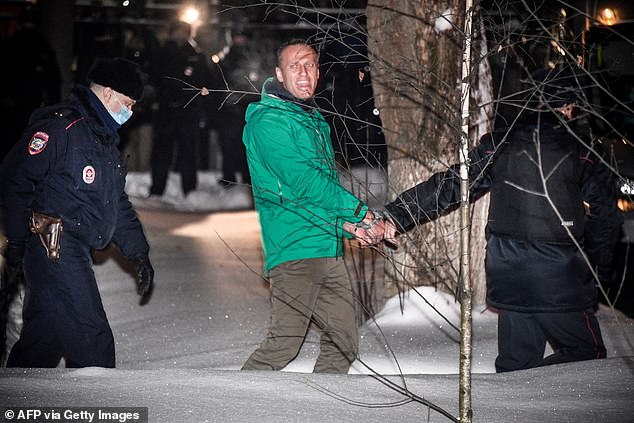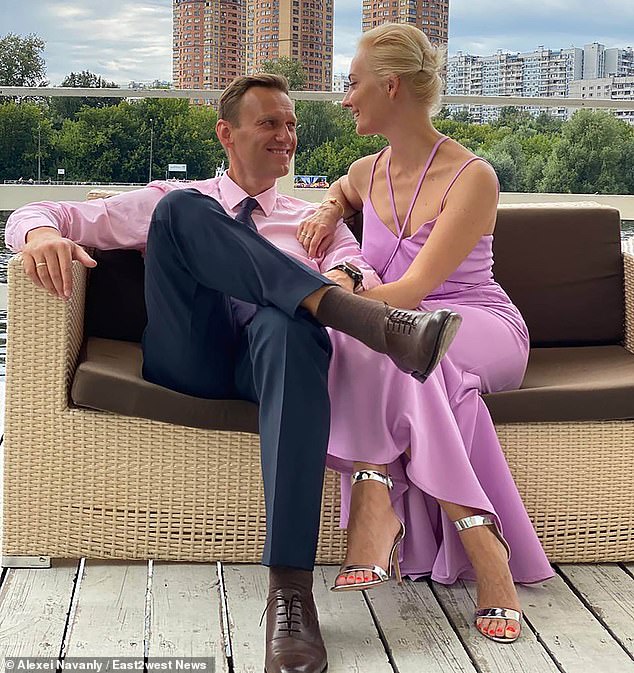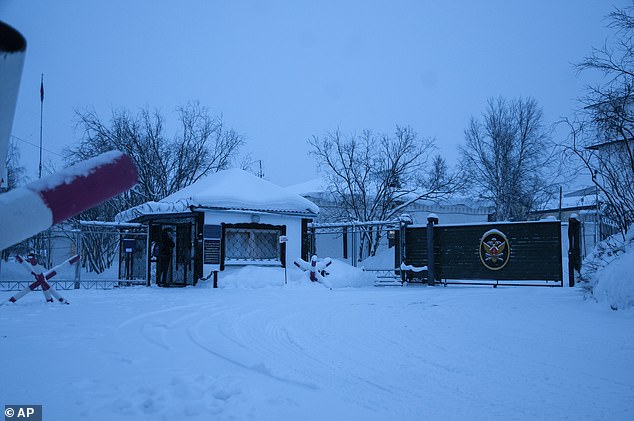It has been claimed that Vladimir Putin would ask for updates on the brutal punishments meted out to Alexei Navalny in the penal colony where he collapsed and died yesterday.
The Russian president is accused of the “murder” of his staunchest critic, who died while serving a 19-year prison sentence in an Arctic penal colony.
Reports have previously claimed that Putin “wants to know everything that happens to Navalny.” All the details, the punishments.’ It has even been claimed that he demanded images of Navalny inside the shadowy colony where he was being held.
Prison guards have also been accused of trying to “destroy Navalny’s health by all means and forces,” according to the opposition leader’s lawyer, Vadim Kobzev.
Navalny was last seen at a court appearance on Thursday. Footage from the hearing showed the 47-year-old smiling and making jokes about the judge’s salary, appearing brave in the face of his deadly situation.
A view of the entrance to the penal colony in the town of Kharp, in the Yamalo-Nenetsk region, about 1,200 miles northeast of Moscow, Tuesday, Jan. 23, 2024.

Vladimir Putin, pictured in Russia on Friday, reportedly demanded updates on Navalny in prison, where guards have been accused of trying to “destroy (the opposition leader’s) health by all forces and means.”
“Your Honor, I will send you my personal account number so that you can use your enormous salary as a federal judge to ‘warm up’ my personal account, because I am running out of money,” Navalny said, drawing smiles from others in the courtroom.
He appeared in a black prison uniform and spoke from behind a barred window.
Hours later, Navalny was dead. The Russian prison service said he had fainted and lost consciousness after a walk through the penal colony. Doctors were unable to revive him, according to the announcement.
His lawyer recently said that Navalny had lost 7kg in weight and was “deliberately infected” with an unknown acute viral respiratory illness while in a hellish punishment cell.
Navalny “did not receive the proper medications, but was treated with huge doses of antibiotics that should not have been used,” Kobzev said.
The lawyer said: ‘Navalny was told he would be moved to a cell for the maximum possible period of six months.
“These actions cannot be considered anything other than an open strategy to destroy Navalny’s health by all forces and means.”
Along with reports that Putin showed a sadistic interest in Navalny’s treatment, it has even been previously claimed that he requested video footage and live streams of the opposition leader in prison.
The shocking news of Navalny’s death, less than a month before an election that will give Putin another six years in power, sparked renewed criticism and outrage directed at the Kremlin leader, who has repressed all opposition in his country. .
Online media outlet SOTA reported that Thursday’s court session was convened after an “argument” with a prison official who attempted to confiscate Navalny’s pen.
Navalny wrote later on Thursday that he had been imposed 15 days of isolation.
Since he was first jailed in January 2021, Navalny had been in and out of solitary confinement, which is often used to punish rule-breakers in the Russian prison system.
After the hearing, Navalny took to social media. ‘The Yamal prison decided to break Vladimir’s record of flattering and pleasing the Moscow authorities. “They just gave me 15 days of isolation,” he wrote in X.
“This is the fourth period of isolation in less than two months that I have been with them,” he added.
It was the last message of this type he wrote.

Russian media announced Navalny’s death, citing the Siberian prison service where he was serving his sentence, sparking shock and anger around the world, and world leaders quickly pointed the finger at Russian President Vladimir Putin (pictured Russia today).

Opposition leader Alexei Navalny is escorted out of a police station on January 18, 2021.

Navalny, pictured with his wife Yulia in happier times, crusaded against official corruption and organized mass anti-Kremlin protests, drawing the Kremlin’s ire.
Western leaders and others who have opposed Putin’s government praised Navalny’s bravery.
The opposition leader’s health has deteriorated recently and the cause of his death may never be known, but many world leaders said they held Russian authorities ultimately responsible for his death.
If confirmed, “his death in a Russian prison and a man’s fixation and fear only underscore the weakness and rot at the heart of the system Putin has built.” “Russia is responsible for this,” said US Secretary of State Antony Blinken during a conference in Germany.
German Chancellor Olaf Scholz said Navalny “has probably now paid with his life for this courage.”
At Scholz’s side, Ukrainian President Volodymyr Zelenskyy, whose country is fending off the Russian invasion, said: “Putin doesn’t care who dies so he can keep his job.”
Kremlin spokesman Dmitry Peskov said Putin was informed of Navalny’s death. The opposition leader’s spokeswoman, Kira Yarmysh, said on X, the platform formerly known as Twitter, that the team had no confirmation yet.
Shortly after the death was reported, Russian social media channel SOTA shared images of the opposition politician, reportedly in court yesterday. In the footage, Navalny can be seen standing, laughing and joking with the judge via video link.
Navalny was transferred in December from a prison in central Russia to a “special regime” prison colony (the country’s highest security level) above the Arctic Circle.
His allies denounced the move to a colony in the town of Kharp, in a region about 1,900 kilometers (1,200 miles) northeast of Moscow, as yet another attempt to force Navalny into silence.
Before his arrest, Navalny campaigned against official corruption, organized major anti-Kremlin protests and ran for public office.
In Putin’s Russia, political opponents often disappeared amid factional disputes or went into exile after imprisonment, suspected poisoning or other harsh repressions. But Navalny consistently grew stronger and rose to the top of the opposition through courage, bravery and a deep understanding of how social media could bypass the Kremlin’s smothering of independent media.
He faced every setback, whether physical assault or imprisonment, with intense devotion, meeting dangers with sardonic wit. That led to the bold and fateful decision to return from Germany to Russia and certain arrest.
Prison authorities repeatedly locked Navalny in a small cell to punish him for minor infractions. Last month, he said he was placed in such a cell after officials accused him of refusing to “report in accordance with protocol.”
The small cell placement means that prisoners are only allowed to walk outside in a narrow concrete courtyard early in the morning. “Few things are as refreshing as a walk through Yamal at 6:30 in the morning,” she wrote.
Navalny was born in Butyn, about 40 kilometers (25 miles) from Moscow. She earned a law degree from People’s Friendship University in 1998 and a fellowship at Yale in 2010.
It gained attention by focusing on corruption in Russia’s murky mix of politicians and businesses; One of his first moves was to buy a stake in Russian oil and gas companies to become an activist shareholder and drive transparency.
By focusing on corruption, Navalny’s work had pocket appeal to the widespread sense that Russians were being deceived, and had a stronger resonance than more abstract and philosophical concerns about democratic ideals and human rights.
He was convicted in 2013 of embezzlement in what he called a politically motivated prosecution and sentenced to five years in prison, but later, shockingly, prosecutors demanded his release pending appeal. A higher court later imposed a suspended sentence on him.
The day before the sentencing, Navalny had registered as a candidate for mayor of Moscow. The opposition saw his release as a result of large protests in the capital over his sentencing, but many observers attributed it to the authorities’ desire to add a touch of legitimacy to the mayoral election.
Navalny finished second, an impressive performance against the incumbent who had the backing of Putin’s political machine and was popular for improving the capital’s infrastructure and aesthetics.
Navalny’s popularity surged after top charismatic politician Boris Nemtsov was shot dead in 2015 on a bridge near the Kremlin.
Whenever Putin spoke about Navalny, he made sure to never mention the activist by name, referring to him as “that person” or similar words, in an apparent effort to diminish his importance.


